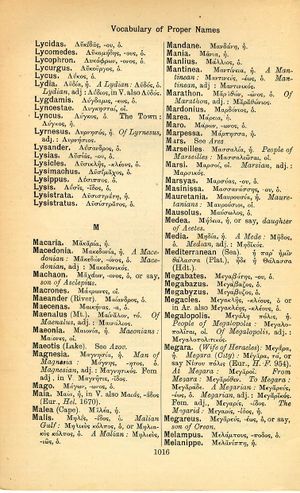Maeander: Difference between revisions
Γήρως δὲ φαύλου τίς γένοιτ' ἂν ἐκτροπή; → Senectutis non habetur effugium malae → Wie könnte man dem schlimmen Alter wohl entflieh'n?
(D_5) |
(Gf-D_5) |
||
| Line 1: | Line 1: | ||
{{WoodhouseENELnames | {{WoodhouseENELnames | ||
|Text=[[File:woodhouse_1016.jpg|thumb|link= | |Text=[[File:woodhouse_1016.jpg|thumb | ||
|link={{filepath:woodhouse_1016.jpg}}]](River) [[Μαίανδρος]], ὁ. | |||
}} | }} | ||
{{Lewis | {{Lewis | ||
| Line 6: | Line 7: | ||
}} | }} | ||
{{Gaffiot | {{Gaffiot | ||
|gf=<b>Mæander</b>¹³ Liv. 38, 13, 6, <b>-drus</b> Sil. 7, 139 ou <b>-drŏs</b>, ī, m., Ov. M. 2, 246 ([[Μαίανδρος]]),<br /><b>1</b> Méandre [fleuve de cours sinueux]<br /><b>2</b> [fig.] tours, détours : Cic. Pis. 53 ; Amm. 30, 1, 12 ; dialecticæ Mæandri Gell. 16, 8, 17, les méandres de la dialectique || bordure circulaire, bande qui serpente : Virg. En. 5, 251 ; cf. Non. 140 ; P. Fest. 136. | |gf=<b>Mæander</b>¹³ Liv. 38, 13, 6, <b>-drus</b> Sil. 7, 139 ou <b>-drŏs</b>, ī, m., Ov. M. 2, 246 ([[Μαίανδρος]]),<br /><b>1</b> Méandre [fleuve de cours sinueux]<br /><b>2</b> [fig.] tours, détours : Cic. Pis. 53 ; Amm. 30, 1, 12 ; dialecticæ Mæandri Gell. 16, 8, 17, les méandres de la dialectique || bordure circulaire, bande qui serpente : Virg. En. 5, 251 ; cf. Non. 140 ; P. Fest. 136.||bordure circulaire, bande qui serpente : Virg. En. 5, 251 ; cf. Non. 140 ; P. Fest. 136. | ||
}} | }} | ||
Revision as of 07:41, 14 August 2017
English > Greek (Woodhouse)
(River) Μαίανδρος, ὁ.
Latin > English (Lewis & Short)
Maeander: (Maeandros or Mae-andrus), dri, m., = Μαιανδρος,
I a river, proverbial for its winding course, which rises in Great Phrygia, flows between Lydia and Caria, and falls, near Miletus, into the Icarian Sea, now Mendere Su; nom. Maeander, Liv. 38, 13, 7; Sen. Ep. 104, 15; Plin. 2, 85, 87, § 201; 5, 29, 31, § 113; Claud. Eutr. 2, 266; Avien. Perieg. 999: Maeandros, Ov. M. 2, 246; 8, 162; id. H. 9, 55: Maeandrus, Sil. 7, 139; Paul. ex Fest. p. 136 Müll.; acc. Maeandrum, Liv. 38, 12; 13: Maeandron, Luc. 3, 208: more Maeandri, i. e. with turnings and windings, Col. 8, 17, 11.—
2 Personified, acc. to the fable, the father of Cyane, and grandfather of Caunus and Byblis, Ov. M. 9, 450.—
B Transf. (from the windings of the Mæander), as an appellative, and hence also in the plur.
1 A crooked or roundabout way, a turning, twisting, winding, meandering, maze, etc.: quos tu Maeandros, quae deverticula flexionesque quaesisti? Cic. Pis. 22, 53; Amm. 30, 1, 12; cf. Ov. M. 2, 246; 8, 162 sqq.; Sil. 7, 139; Sen. Herc. Fur. 683: in illis dialecticae gyris atque Maeandris, Gell. 16, 8, 17: Maeandros faciebat et gyros, etc., Amm. 30, 1: Mĕandros, Prud. Cath. 6, 142.—
2 In embroidery, a border wrought with many involutions or windings: victori chlamydem auratam, quam plurima circum Purpura Maeandro duplici Meliboea cucurrit, Verg. A. 5, 251; cf. Serv. in loc.; cf. Non. 140, 2, and Paul. ex Fest. p. 136 Müll.— Hence,
II
A Maeandrĭus, a, um, adj., = Μαιάνδριος.
1 Of or belonging to Mæander, Mæandrian: juvenis Maeandrius, i. e. Caunus, the grandson of Mæander, Ov. M. 9, 573.—
2 Of or belonging to the river Mæander, Mæandrian: unda, Prop. 3, 32, 35: flumina, Claud. VI. Cons. Honor. 635.—
B Maeandrĭcus, a, um, adj., Mæandrian (acc. to I. B. 2.): fluxus, Tert. Pall. 4 med.—*
C Maeandrātus, a, um, adj., full of curves like the Mæander, Mæandrian: facies Maeandrata et vermiculata, Varr. ap. Non. 140, 5 (Sat. Men. 86, 14).
Latin > French (Gaffiot 2016)
Mæander¹³ Liv. 38, 13, 6, -drus Sil. 7, 139 ou -drŏs, ī, m., Ov. M. 2, 246 (Μαίανδρος),
1 Méandre [fleuve de cours sinueux]
2 [fig.] tours, détours : Cic. Pis. 53 ; Amm. 30, 1, 12 ; dialecticæ Mæandri Gell. 16, 8, 17, les méandres de la dialectique || bordure circulaire, bande qui serpente : Virg. En. 5, 251 ; cf. Non. 140 ; P. Fest. 136.

